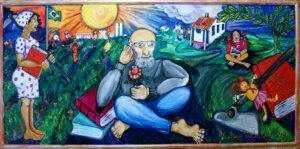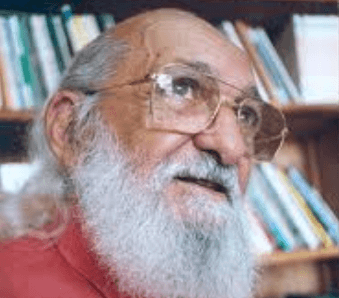Paulo Freire, an Educator Who Changed the World

Most educators are familiar with Paulo Freire and his pedagogy of hope. His ideas enriched the field of education and have become the center of countless democratic movements all over the world. For Freire, teaching and learning were part of life, not just academia.
Freire’s full name was Paulo Reglus Neves Freire. He was born on September 19th, 1921, in Recife in the state of Pernambuco, one of the poorest areas of Brazil. His father was in the military and his mother was a devoted housewife who raised her children with strict Catholic principles.
“No one educates anyone else nor do we educate ourselves, we educate one another in communion in the context of living in this world.”
-Paulo Freire-
His family was middle class, but they had hard times as well. Freire never excelled in school. He decided to study law but had to stop several times due to financial hardship. In 1944, he finally got his degree.

A rising star
In 1944, he got married to Elza Maria Oliveira, an elementary school teacher who had an important impact on his life. He also worked as a Portuguese teacher for a year in several middle schools. That was when he started to encourage students, parents, and the community to critically evaluate the conventional education model.
Later, he studied literature. In 1959, he got his Ph.D. in Philosophy and History of Education. Soon after that, he started to make a name for himself in the world of education. In 1963, he participated in the National Literacy Campaign and managed to teach 300 rural workers to read in just a month and a half. A lot of people started to see him as a political agitator.
In 1964, there was a military coup d’état in Brazil. By that time, Paulo Freire was seen as a subversive educator and was imprisoned on two occasions. That led him to seek political asylum at the Bolivian Embassy. Later, he fled to Chile, where he worked with the government of Eduardo Frei on education issues.
Paulo Freire at Harvard
In 1968, Freire published his first book titled Education, The Practice of Freedom. His fame grew and Harvard University invited him to teach classes. In the United States, he was able to make significant progress on his pedagogical theories. His book Pedagogy of the Oppressed brought him international acclaim.
Freire wrote about an educational system with a purpose beyond just acquiring knowledge. He believed that true education included developing good judgment and providing people with the tools to work for their own liberation from the exploitative systems they live in.
Freire believed that the path to liberation was critical thinking and dialogue. He also advocated for a truly democratic education in which everyone would understand science and education aren’t neutral. With this philosophy as a foundation, he developed a highly effective literacy training system.
Paulo Freire’s legacy
Freire returned to Brazil in 1980 and helped found The Workers Party (Partido dos Trabahaldores or PT in Portuguese). The Pontifical Catholic University of São Paulo and the São Paulo State University also hired him to teach. He continued to teach and advocate for his vision of critical pedagogy.
Freire was convinced that learning isn’t passed from one person to another. Instead, it’s a building process between people. Consequently, the most important thing in the learning process is student participation. He believed that the world doesn’t need people who repeat ideas; the world needs creators who build new possibilities.
In his perspective, the most important part of education is encouraging creativity and clearing the path to individual and collective liberty. Knowledge isn’t born in a vacuum. It comes out of specific conditions, which means that it’s never neutral.

An educator who left a mark on the world
In 1986, Freire’s wife suddenly died. They had five children together and had been on many adventures all over the world. Shortly after her death, Freire married Anna Maria, a young woman who had been his student.
In 1989, Freire became the Secretary of Education in São Paulo. This is the most populated state in Brazil in one of the most populated countries in the world. As the Secretary of Education, Freire was able to turn some of his ideas into policies and notably improved the situation for the teachers in the state.
Paulo Freire’s books have been translated into 18 languages. Approximately 20 universities have given him honorary doctoral degrees. On May 2, 1997, he died in São Paulo at the age of 75. His life and work have inspired thousands of educators all over the world.
All cited sources were thoroughly reviewed by our team to ensure their quality, reliability, currency, and validity. The bibliography of this article was considered reliable and of academic or scientific accuracy.
- Monclús, A., & Freire, P. (1988). Pedagogía de la contradicción: Paulo Freire: nuevos planteamientos en educación de adultos: estudio actualizado y entrevista con Paulo Freire (Vol. 30). Anthropos Editorial.
This text is provided for informational purposes only and does not replace consultation with a professional. If in doubt, consult your specialist.








